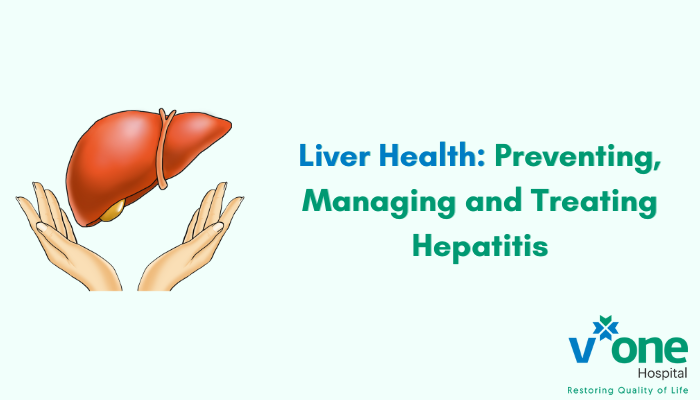Liver Health: Preventing, Managing and Treating Hepatitis
The liver is one of the most important organs in our body. It plays a crucial role in detoxifying harmful substances, storing vitamins and minerals, and producing bile, which helps digest fats. Given its significance, maintaining liver health is paramount. Hepatitis, a condition marked by liver inflammation, can severely impact liver function. Understanding how to prevent and manage hepatitis is essential for maintaining overall health.
What is Hepatitis?
Hepatitis refers to inflammation of the liver and can be caused by various factors, including viral infections, alcohol abuse, medications, and autoimmune diseases. The most common types of viral hepatitis are Hepatitis A, B, C, D, and E. Each type has different modes of transmission and effects on the liver.
Types of Hepatitis
1. Hepatitis A: Transmitted through consuming contaminated food or water. It is usually acute and does not lead to chronic liver disease.
2. Hepatitis B: Spread through contact with infectious body fluids, such as blood, semen, and vaginal secretions. It can be both acute and chronic.
3. Hepatitis C: Primarily transmitted through blood-to-blood contact. This type often leads to chronic infection.
4. Hepatitis D: Occurs only in individuals already infected with Hepatitis B. It can cause severe liver disease.
5. Hepatitis E: Typically spread through contaminated water. It is generally acute and self-limiting.
Symptoms of Hepatitis
Hepatitis symptoms can vary depending on the type and stage of the disease. Common symptoms include:
- Fatigue
- Jaundice (yellowing of the skin and eyes)
- Abdominal pain and swelling
- Dark urine
- Pale stool
- Nausea and vomiting
- Loss of appetite
- Fever
Early Detection and Treatment are Crucial to Prevent Severe Liver Damage.
Preventing Hepatitis
Preventing hepatitis involves a combination of lifestyle choices, vaccinations, and practicing safe behaviors.
Vaccinations
Vaccines are available for Hepatitis A and B. These vaccines are highly effective and provide long-term protection. It is advisable to get vaccinated, especially if you are at higher risk, such as healthcare workers, travelers to endemic areas, or individuals with chronic liver disease.
Safe Practices
1. Personal Hygiene: Always wash your hands thoroughly with soap and water, especially after using the restroom and before eating.
2. Safe Sex: Use condoms and ensure both you and your partner are tested for hepatitis and other sexually transmitted infections.
3. Avoid Sharing Needles: If you use injectable drugs, never share needles or other drug paraphernalia.
4. Blood Safety: Ensure that any blood transfusion or medical procedure involving blood is conducted using screened and safe blood products.
Healthy Lifestyle Choices
1. Moderate Alcohol Consumption: Excessive alcohol intake can damage liver cells and exacerbate hepatitis. Limit alcohol consumption to maintain liver health.
2. Healthy Diet: A balanced diet rich in fruits, vegetables, lean proteins, and whole grains supports liver function. Avoid processed foods and excessive fats.
3. Regular Exercise: Physical activity helps maintain a healthy weight and reduces liver fat, which can prevent non-alcoholic fatty liver disease.
4. Avoid Toxins: Reduce exposure to environmental toxins and chemicals that can harm the liver. Always use protective gear when handling chemicals.
Hepatitis Treatment and Management
If diagnosed with hepatitis, managing the condition involves medical treatment, lifestyle adjustments, and regular monitoring.
Medical Treatments
1. Antiviral Medications: For chronic Hepatitis B and C, antiviral medications can help reduce viral load and slow the progression of the disease.
2. Liver Transplant: In severe cases of liver failure due to hepatitis, a liver transplant may be necessary.
3. Immunoglobulin: For Hepatitis A and B, immunoglobulin injections can provide short-term protection if exposed to the virus.
Lifestyle Adjustments
1. Healthy Diet: Continue with a liver-friendly diet. Avoid alcohol and limit your intake of salt, sugar, and unhealthy fats.
2. Hydration: Drink plenty of water to help the liver function optimally.
3. Medication Adherence: Follow your doctor’s prescription plan rigorously to manage the condition effectively.
4. Regular Monitoring: Regular check-ups with your healthcare provider are essential to monitor liver function and adjust treatment as needed.
Mental Health Support
Living with chronic hepatitis can be stressful and impact mental health. Seeking support from mental health professionals, joining support groups, and maintaining a strong social network can help manage the emotional aspects of the disease.
Regular Monitoring
Regular follow-ups with a healthcare provider are crucial for managing hepatitis. This includes blood tests to monitor liver function, imaging studies to assess liver health, and possibly liver biopsies for more detailed information.
The Importance of Awareness and Education
Raising awareness about hepatitis and educating people on prevention methods are vital steps in reducing the incidence of the disease. Public health campaigns, school education programs, and community workshops can play significant roles in spreading knowledge about hepatitis prevention and management.
Community and Support
Building a supportive community around those affected by hepatitis is essential. Support groups, both in-person and online, can provide emotional support, share experiences, and offer practical advice for living with hepatitis.
Advocacy and Policy
Advocating for policies that promote liver health, such as funding for vaccination programs, access to clean water, and safer healthcare practices, can help prevent the spread of hepatitis. Supporting research into new treatments and a possible cure for hepatitis also contributes to better management and eventual eradication of the disease.
Conclusion
Hepatitis is a significant health concern that requires a comprehensive approach to prevention and management. By getting vaccinated, practicing safe behaviors, and adopting a healthy lifestyle, we can protect our liver from hepatitis. For those diagnosed with hepatitis, effective management through medical treatments, lifestyle adjustments, and regular monitoring is essential. Awareness, education, and community support play crucial roles in preventing hepatitis and improving the lives of those affected by it. Taking these steps not only ensures liver health but also contributes to overall well-being.

